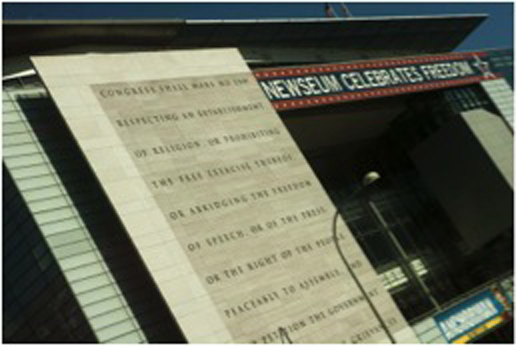I had the opportunity to go to the Newseum in Washington, D.C. this past break, and something struck me: technology has completely changed the face of how news is shared. Look at this website, for example! I’m writing to people who have never met me in real life, who may have not even set foot in Seattle, and I don’t even need a printer or any real credentials to do it. News travels faster than ever thanks to tweeting, e-mailing, commenting, facebooking, sharing, and thousands of other ways of communicating via the magical, ethereal network known as the internet. I know this is a science blog, but to me, technology and its interface with the real world is a part of science as much as environmental research or particle physics is a part of science.

The Newseum, the large, modern building with the First Amendment on a 50-foot-high facade. They have an Anchorman exhibit right now if you get the chance to visit. It was silly (but fun).
As we look back in time, we can see how types of news outlets changed.
For example, when public radio was invented and became widely available, information about an event across a continent could reach an audience within minutes if urgent enough. Radio was a great form of entertainment for people before television, and for those who couldn’t afford T.V.s until they became more popular. I always imagine the stereotypical radio announcer voice talking about how the Yankee’s are doing, but that may be because I watch too many old movies. I don’t know if people really listened to radio for sports news as often as I think they did.
Television could tell people about the inauguration of a new president and have live coverage in an instant. Since it started in the 1920s with fuzzy sound and black and white pictures, television has played a central role in feeding news to the masses. Sitting around eating dinner at the TV or setting aside time to watch a specific show has been a part of American culture for decades, and it remains a major form of entertainment. It’s far more popular than print newspapers and (for many demographics) internet resources, but some say television may be headed out the door as the top news source all thanks to the interwebs.
Today, we can keep up with events thousands of miles away through people tweeting and writing about what is immediately happening. The internet is without a doubt the most diverse, fast, and widely-spread news source available. People are publicly posting events as they happen, complete with cell phone videos and pictures. It’s news at its most raw. I’ve seen first-hand tweets and Facebook posts from people going through revolutions, riots and protests. I’ve seen completely unedited photos and statements from the people directly involved and it makes news feel that much more alive to me. News from the primary source itself is a treasure.
As with all great things, however, the internet isn’t always the most trustworthy source of information, either. With people like me, who have no real credentials but have access to a computer and an internet connection, able to report, there are ever-increasing amounts of bad news out there (not saying I am one of them). With all that great uncut news reporting comes some really terrible and shoddy reporting. As a consumer of news myself, I still have to ask questions and make sure that what I’m reading is viable and accurate (as all news consumers of any medium should do!).
I’m excited to see where the internet takes us in the context of information sharing and global connection to politics, wars, economics and history-in-the-making. Technology has been so much fun to watch as it leaps and bounds into unfamiliar territories. Just think; for the past 100,000 years humans have been around, we’ve only been able to communicate across oceans instantly for a tiny, tiny fraction of that time. And to think you complained about how that mobile Facebook status you just tried to submit wouldn’t go through faster than five seconds…
Links:
The Bloomberg Internet, TV, and Radio Gallery
http://www.newseum.org/exhibits-and-theaters/permanent-exhibits/itvr/index.html











